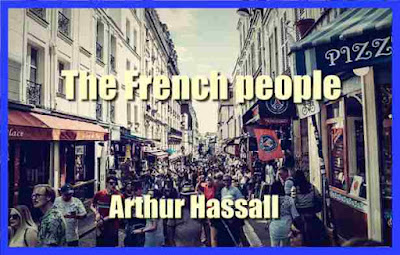Download The French people - PDF book by Arthur Hassall
The French people
 |
| The French people |
The French people is a pleasantly written book by one who has made a study of French life, particularly on its lighter side.
Excerpt:
Four great rivers are to be found in France. Of these, the Rhone flows from north to south between the Alps and the Cevennes and passes Lyons, Vienne, Orange, Avignon, and Aries before it falls into the Medi- terranean. Above Lyons the population is mainly Gallic; below it is to be found Ligurians with traces of Greek and Roman blood.
The Garonne, which flows from east to west, drains Guienne and Gascony and passes by Bordeaux into the Bay of Biscay. South of this river, in the southwestern corner of France, are still to be found the Basques, an Iberian race who are a dark people, untouched by foreign civilization and attached to seafaring pursuits.
North of the Garonne the Gallic race is to be found, and it is especially pure between the Garonne and the Loire and between the Loire and Normandy. The Loire itself, like the Garonne, flows from the east of France to the western sea, passing by Nevers, Orleans, Blois, Tours, and Nantes. Near it, the Angevin kings of Eng- land spent much of their time, and the whole region is one of the most interesting, historically speaking, in France.
some contents:
I.— The arrival of the Franks ii
The first period in the history of France — Gaul at the time of the Roman Conquest — Gallia Narbonensis — Roman Gaul — Lugdunum or Lyons — Teutonic invasions — The Visigoths — The Burgundians — The Franks — The accession of Clovis — His conversion — Brittany — Burgundy, Aquitaine — Kingdom of the Merovingians — The Prankish settlement — France Christian — Continuity with the Roman Empire.
II. — The alliance with the Church .... 19
Significance of the conversion of Clovis — He becomes the sole sovereign of the Franks — A blow to Arianism — Religious unity — Stability and activity of the Christian Church — Its progress — Its influence — Its alliance with the Frankish kings — Authority of the bishops — The monasteries homes of piety and learning — The Church injured by the alliance — Ecclesiastical and lay aristocracy — Pepin d'Heristal and Caroling supremacy — Reorganization of the Church — Charles Martel — Pepin le Bref — His compact with the Papacy — His grant to the Holy See — Services of Charles the Great to the Church.
III. — Charles the Great and his laws .... 34
The Holy Roman Empire — The strife of ideas — Reorganization of states — Vassal kingdoms — The counts — The clergy — — The missidominici — Feudalization of society — The scabini — The centenary — The emperor's assemblies — The capitularies — The three great political events of Charles's reign — The revival of learning — Frankish power at its zenith — Division of the empire — Influence of the life and death of Charles on the history of Europe.
IV.— Hugh Capet and Paris 47
Decline and fall of the Carolingian dynasty — Service rendered by feudalism — Invasions of the Northmen — Their settlements — Carloman — Charles the Fat — Siege of Paris — Odo or Eudes — He is chosen king — Hrolf — Charles the Simple — Robert, Count of Paris — Louis d'Outremer — Hugh the Great — — Hugh Capet — He is made king — Meaning of his election — It is the starting-point of all later French history — A triumph of feudalism — The Church and Hugh Capet— France in 987 — Beginning of the development of French nationality.
V. — France and the East 64
The crusades and French monarchy — Extension of royal power — Rise of communes — Weakening of feudalism and growth of national sentiment — The crusades a Frankish movement — Jerusalem — Urban II urges a holy war — The state of religion in France — The Hildebrandine revival — The first crusade —, The kingdom of Jerusalem — The contest with Saladin — French nobles in the fourth crusade — Capture of Constantinople — Louis IX leads two crusades — French energy and capacity revealed in the crusades— Their results to Europe and to France — Their effect upon the position of the French feudal nobility— Louis VI — Louis VII and the second crusade — National unity fostered — Prominence of French influence in Europe — Impetus to commerce on the Mediterranean— Additions to historical and practical literature.
VI. — The annexation of Toulouse 78
The noble spirit of the crusades — Contrast with the intolerant motives of the Albigensian crusade — Value of the latter to the French monarchy — The county and city of Toulouse The heresy of the Albigenses— Efforts to convert them— Forcible measures— The beginning of a fierce struggle— It takes a political character— Simon de Montfort— A second crusade — The north against the south— The Treaty of Meaux— Independence of the south destroyed, and the royal domain touches the Med- Mediterranean—Treaty of Lorris— Alfonse of Poitiers— Union of northern and southern France— Fate of the southern civilization — France becomes a great state and nation.
Date: 1910
Publisher New York, D. Appleton and company
Download 8.2 MB
Download 8.2 MB








